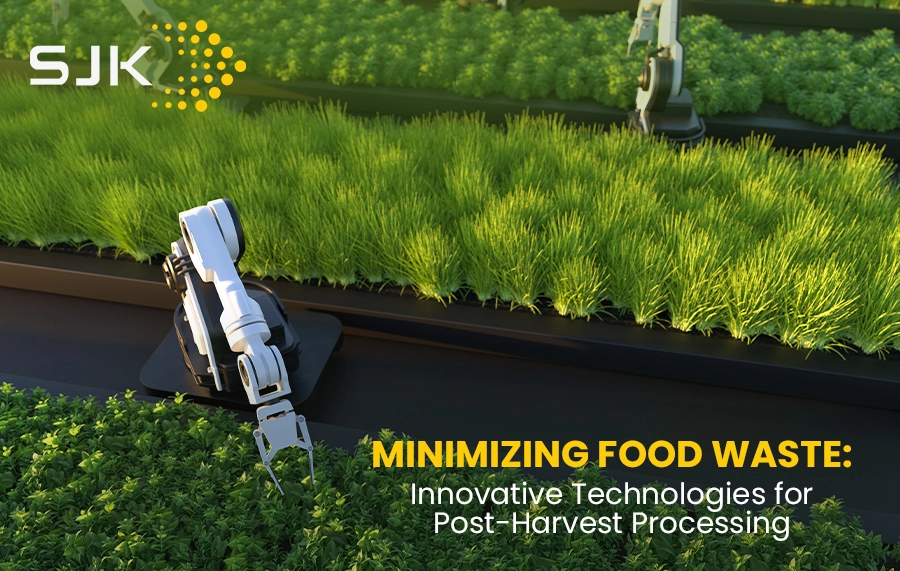Empowering Sustainable Agriculture
Empowering Sustainable Agriculture Through Post-Harvest Automation
Food waste is a global crisis with far-reaching consequences. According to the Food and Agriculture Organization (FAO), roughly one-third of all food produced globally is lost or wasted after harvest. This translates to not only significant economic losses but also impacts food security and sustainability. In a world facing population growth and resource constraints, minimizing food waste is of paramount importance.
This blog post explores the impact of post-harvest losses and delves into innovative technologies that are revolutionizing post-harvest processing, paving the way for a more sustainable food system.
The Scope of Post-Harvest Losses
Post-harvest losses occur at various stages between harvest and consumption. This can include:
Improper handling and storage: Lack of adequate storage facilities, temperature control, and transportation infrastructure can lead to spoilage and spoilage-related losses.
Bruising and damage: Rough handling during harvesting, packaging, and transportation can damage fruits and vegetables, impacting their quality and shelf life.
Inadequate processing techniques: Traditional processing methods can be inefficient, leading to significant waste.
Limited market access: Farmers in remote areas may lack access to efficient distribution channels, leading to produce going to waste.
The consequences of post-harvest losses are far-reaching:
Economic Impact: Losses translate to financial hardships for farmers, impacting their livelihoods and contributing to food insecurity.
Environmental Impact: Food waste decomposes, releasing methane, a potent greenhouse gas. Additionally, the resources used to grow wasted food (water, land, energy) are essentially squandered.
Social Impact: Reduced food availability due to waste can exacerbate hunger and malnutrition, particularly in developing countries.
Technological Advancements in Post-Harvest Processing
Fortunately, advancements in technology offer promising solutions for minimizing post-harvest losses. Here are some key areas of innovation:
Improved Storage Technologies: Controlled atmosphere storage and smart packaging that regulates gas exchange and humidity levels extend the shelf life of fruits, vegetables, and other perishable goods.
Precision Agriculture Techniques: Sensor-based systems and data analytics offer valuable insights into crop health and storage conditions, allowing for proactive measures to minimize losses.
Machine Vision and Robotics: Automated sorting and grading systems powered by machine vision can identify and separate damaged produce, optimizing quality control and minimizing waste.
Advanced Processing Technologies: Innovations like minimal processing techniques (e.g., vacuum packing, aseptic processing) and freeze-drying can significantly extend the shelf life of food products.
Artificial Intelligence (AI) and Big Data: AI can analyze historical data and predict spoilage risks, enabling timely interventions to prevent losses.
The Road Ahead: SJK Innovations' Post-Harvest Agri-Solutions
At SJK Innovations, we understand the importance of minimizing post-harvest losses and are dedicated to providing a comprehensive suite of agri-automation solutions specifically designed to empower a more sustainable future.
Our range of post-harvest solutions goes beyond just generic technology. We offer a targeted approach, addressing key challenges faced during this crucial stage:
Gentle Cleaning: Our Rotary Drum Washer and Fruit & Vegetable Bubble Washer utilize innovative technologies to remove dirt, debris, and contaminants from produce without damaging its delicate structure. This minimizes spoilage and extends shelf life, reducing overall food waste.
Efficient Transportation: The Feed Elevator with Hopper facilitates the smooth and efficient transfer of produce from harvesting locations to processing or storage areas. This minimizes handling and potential damage that could occur during manual transportation.
Optimized Storage and Movement: Our Flat Belt Conveyor systems are designed for gentle product handling, ensuring produce reaches its destination without bruising or damage. These customizable systems can be integrated into existing storage and processing facilities, streamlining workflows and minimizing losses.
The innovative technologies offered by SJK Innovations, coupled with our commitment to expert consultation, seamless integration, and ongoing support, empower agricultural businesses to become more sustainable and efficient. Together, we can create a future where food waste is significantly reduced, and resources are utilized responsibly.


